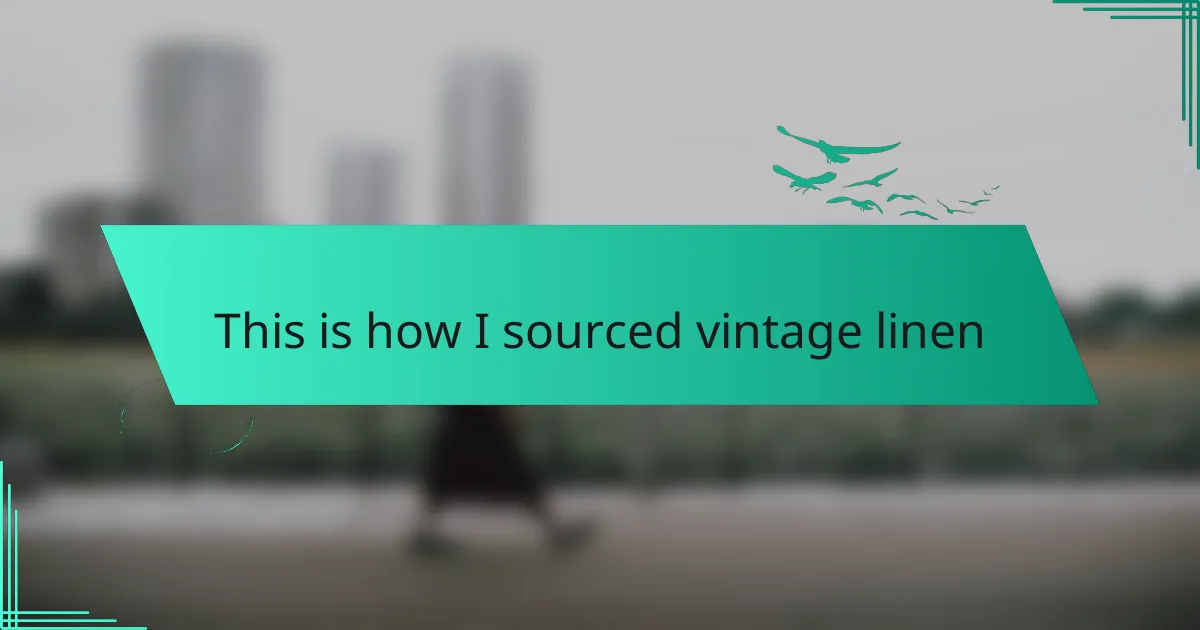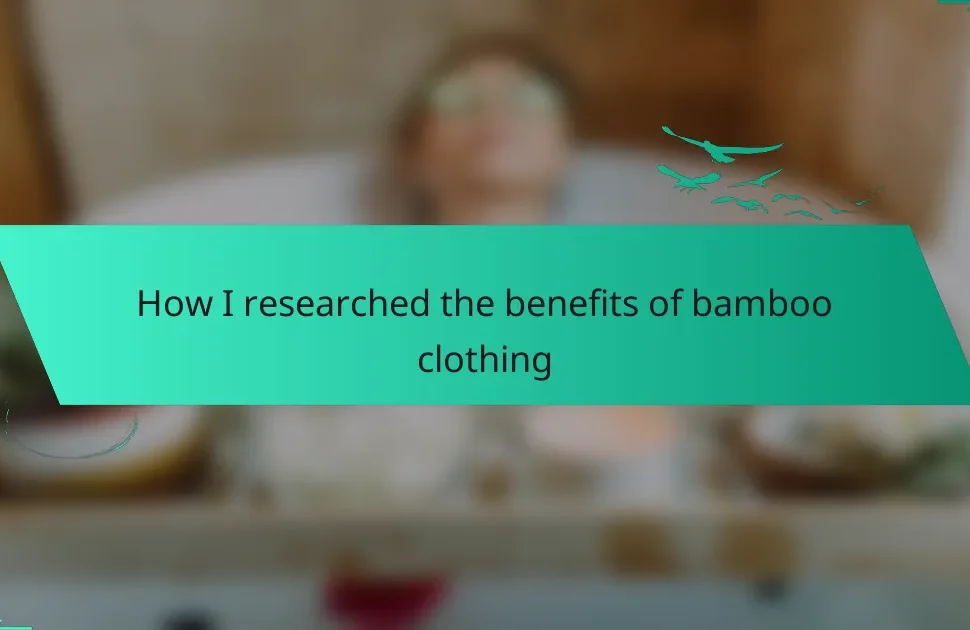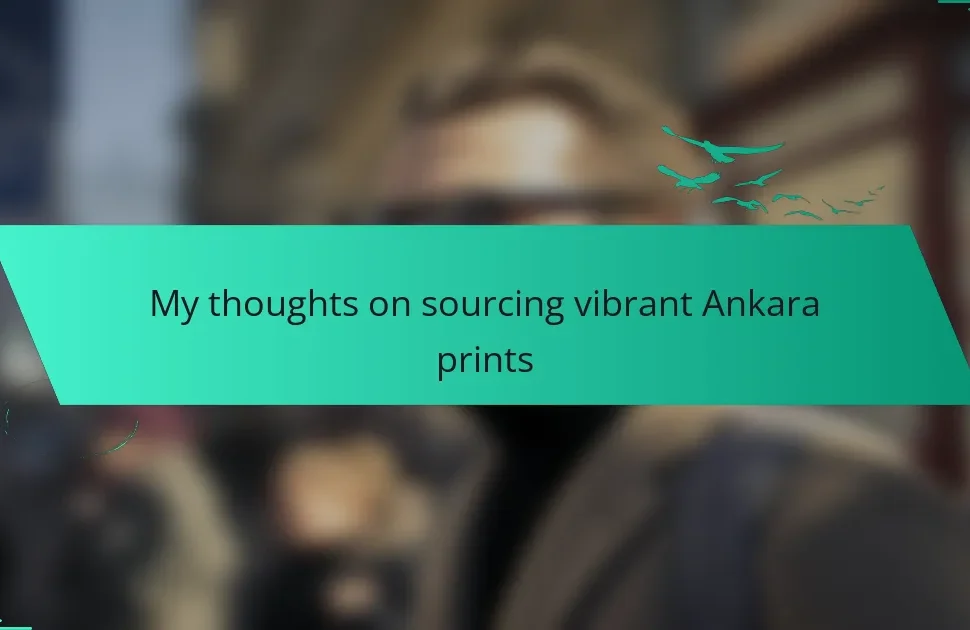Key takeaways
- Vintage linen possesses a unique charm and history, differing from modern textiles in texture, patterns, and signs of wear that add character.
- Sourcing vintage clothing contributes to sustainability by reducing waste and encouraging conscious consumerism, each piece evoking personal stories.
- Thrift shops, estate sales, and online marketplaces are excellent venues for finding quality vintage linen, offering a range of unique options.
- Caring for vintage linen involves gentle cleaning and storage practices to ensure longevity, allowing the fabrics to continue their narrative for future generations.
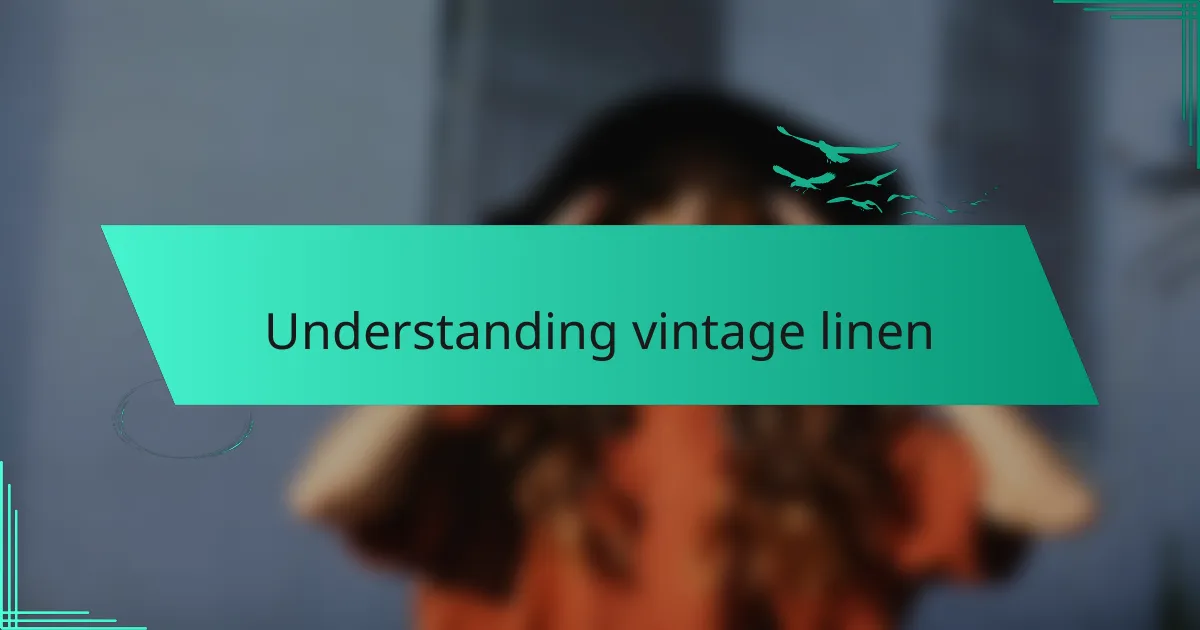
Understanding vintage linen
When I first delved into the world of vintage linen, I was captivated by the stories woven into each piece. Vintage linen is not just a fabric; it carries a unique charm and history that modern textiles often lack. I remember that thrilling moment when I found an exquisite linen tablecloth at a local flea market, its faded patterns whispering tales of elaborate dinner parties from decades past.
Understanding the nuances of vintage linen can significantly enhance your sourcing journey. It’s essential to recognize various qualities and characteristics that distinguish vintage linen from contemporary options. Here are some key points I’ve learned along the way:
- Texture and Feel: Vintage linen often has a softer, more worn feel compared to new linen, which can sometimes feel stiffer.
- Natural Fibers: Authentic vintage linen is made from 100% natural fibers, providing not just beauty but also breathability and durability.
- Patterns and Weaves: Look for unique patterns, weaves, or colors that reflect the era it comes from. Each design has a story!
- Signs of Wear: Small imperfections or wear adds character. Personally, I find these details enhance the piece’s charm.
- Sourcing Locations: Antique shops, estate sales, and online marketplaces are treasure troves for finding genuine vintage linen.

Importance of vintage fashion
The importance of vintage fashion lies in its unique ability to tell a story. Each piece has its own history, which can evoke emotions and memories in ways that new clothes simply can’t. I often think about the treasures I’ve found; wearing them feels like donning a piece of someone’s past. Does that deep connection not enrich our own fashion choices?
Another crucial aspect is sustainability. In a world where fast fashion prevails, vintage clothing offers an eco-friendly alternative. Choosing vintage helps reduce waste and promotes conscious consumerism. It’s satisfying to know that I’m making a positive impact, one lovingly sourced piece at a time.
Finally, vintage fashion empowers individuality. When I wear a unique vintage item, I express my personality in a way that mass-produced clothing never could. Each vintage find adds a distinct flair to my wardrobe, allowing me to stand out in a sea of sameness. Isn’t it refreshing to wear something that feels genuinely “you”?
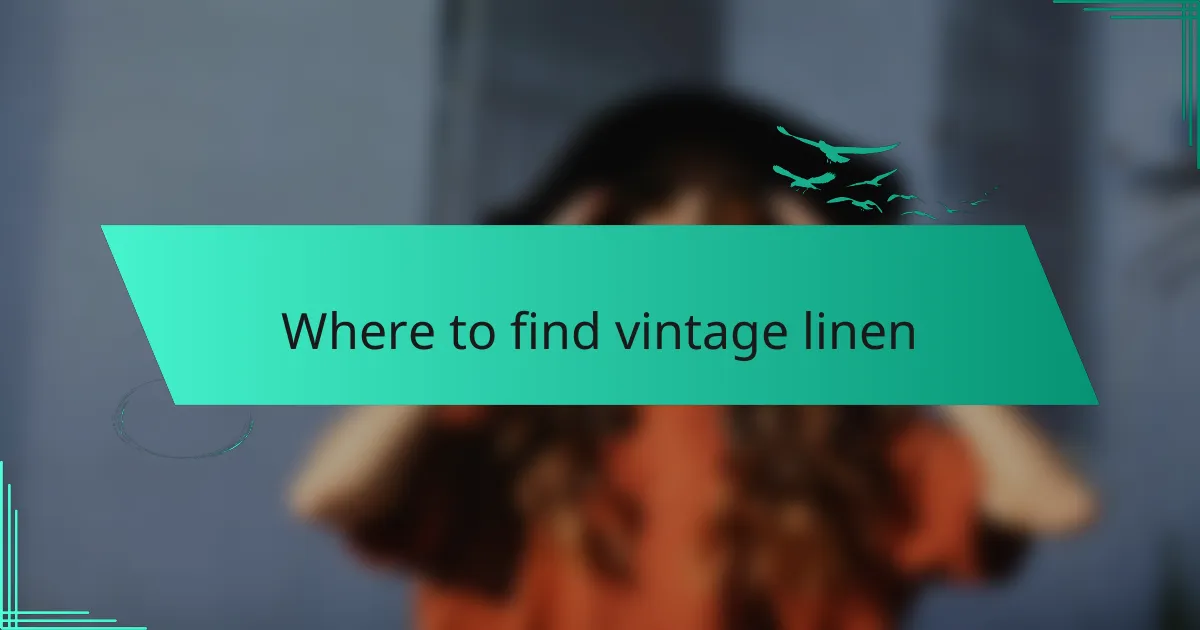
Where to find vintage linen
When it comes to sourcing vintage linen, I find that local thrift shops are often treasure troves of hidden gems. There’s something exhilarating about rummaging through racks, not knowing what unique finds you might stumble upon. I can’t tell you how many times I’ve been pleasantly surprised by a beautifully embroidered piece that felt like it had a story to tell.
Estate sales and vintage fairs are another great option. I remember attending a local estate sale that was filled with stunning vintage textiles. Each piece I picked up had its own charm, and I left with a heavy bag filled with linen that felt like a slice of history. Online marketplaces like Etsy also offer a plethora of options, allowing you to shop from the comfort of your home, but the thrill of in-person hunting is hard to match!
Here’s a quick comparison of some popular venues for finding vintage linen:
| Source | Pros |
|---|---|
| Local Thrift Shops | Unique finds, supportive of local communities |
| Estate Sales | High-quality pieces, often priced to sell |
| Vintage Fairs | Variety of sellers, often curated selections |
| Online Marketplaces (e.g., Etsy) | Convenience, ability to research sellers |

Tips for selecting quality linen
When selecting quality vintage linen, I always start by evaluating the texture and feel. A soft, worn-in essence often indicates authentic vintage linen, while newer options might lack that charm. I remember feeling a delightful connection to a particularly soft piece I found; it was as if the fabric had a series of stories just waiting to be revealed through lived experience.
Next, I pay close attention to the patterns and weaves. Unique designs can reflect the era the linen comes from, and spotting these nuances is often like discovering a hidden treasure. For example, I once unearthed a beautifully intricate lace edge on a tablecloth—such detail can make a piece truly special. It only raises the question: how many memories has it already witnessed?
Lastly, I always assess signs of wear carefully. Small imperfections, such as faint stains or minor tears, often signify a rich history that makes the fabric feel alive. Some people shy away from flaws, but I find that they add character and depth. After all, don’t we all have a few marks that tell our own stories?
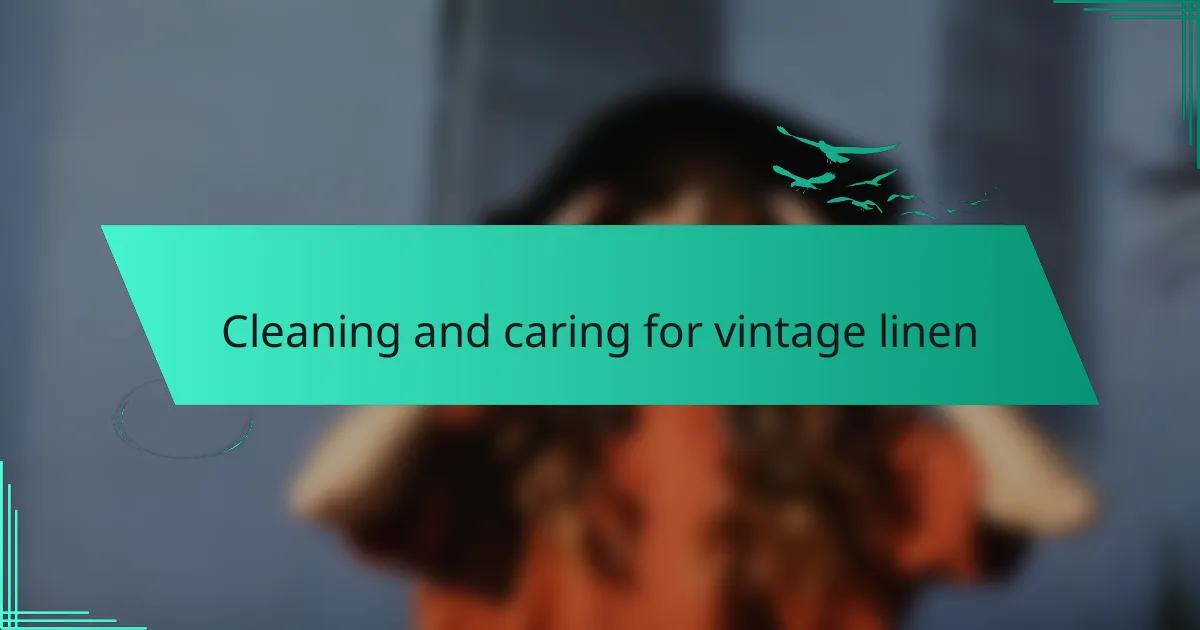
Cleaning and caring for vintage linen
When it comes to cleaning vintage linen, I always approach it with a sense of reverence. These pieces often have stories to tell, and proper care allows them to continue their journey. I remember the first time I found a delicate linen tablecloth at a thrift store. It was stained and crumpled, but after a gentle wash and some love, it transformed beautifully, bringing a special charm to my dining table.
Caring for vintage linen goes beyond just cleaning; it involves understanding the fabric’s characteristics. Here are some tips I’ve found invaluable:
- Always hand wash in cool water with a mild detergent.
- Avoid bleach, as it can weaken the fibers.
- Air dry instead of using a dryer to prevent shrinkage.
- Iron on a low setting to avoid scorching the delicate fabric.
- Store in a cool, dry place, away from direct sunlight to prevent fading.
Each piece of vintage linen deserves this thoughtful treatment, ensuring it continues to be cherished for generations.
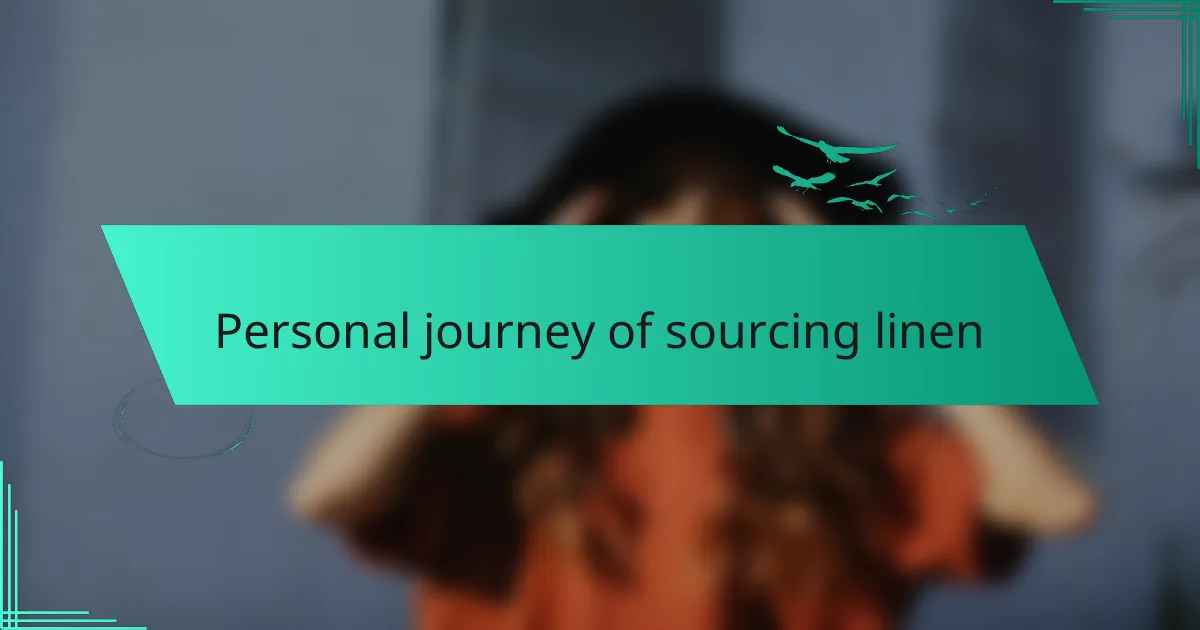
Personal journey of sourcing linen
Sourcing vintage linen has been an incredible journey for me, blending nostalgia with adventure. I remember the thrill of wandering through a small, dusty thrift shop tucked away in a corner of my hometown, where I stumbled upon a beautiful, hand-stitched linen tablecloth. The craftsmanship was captivating, and it instantly took me back to my grandmother’s kitchen, creating a sense of warmth and connection I hadn’t felt in years.
Through this journey, I’ve developed a few strategies that make sourcing vintage linen more enjoyable and fruitful:
- Visit thrift stores and flea markets regularly: You never know what treasures you might find.
- Network with vintage clothing enthusiasts: They often have tips on secret spots and can help you find unique pieces.
- Learn to identify quality fabrics: Understanding what to look for will save you time and money.
- Prioritize condition over perfection: Sometimes a little wear tells a beautiful story.
- Utilize online marketplaces: Sites like Etsy and eBay can be goldmines for unique vintage finds.
- Document your finds: Keeping a journal can help you remember where you found certain pieces and what made them special.
